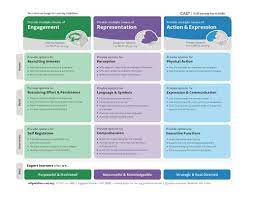In more recent years, UDL has been readily used in education as a means to improve accessibility, equity and engagement for all learners. UDL has become instrumental in the learning design used in many educational systems and is now part of the Individuals with Disabilities Education Act (IDEA) in 2004. In addition, Special Education Technology-British Columbia (SETBC), has done work around UDL, recognizing that it is not a “one-size-fits-all approach; neither does it promote a classroom environment in which each student has an individual educational plan” (Universal Design for Learning in BC Legacy of the BCUDL Project, 2010, p.4). However, it is safe to say that UDL benefits all learners in the classroom today, not just those learners with special needs.
The UDL guidelines are broken down into three well defined principles:
Multiple means of representation- support students’ strengths by addressing varying abilities and learning styles.
Multiple means of expression- support the variety of ways in which students demonstrate their knowledge. While the intention is that all students are expected to work toward the same learning intentions, they may get to the end goal in a variety of ways.
Multiple means of engagement -encourages students with accommodations through flexibility and choice. Multiple means of engagement ensures learners are challenged while engaged and intrinsically motivated to do the task at hand.
https://udlguidelines.cast.org/ provides a great overview of these guidelines, which provides a comprehensive learning framework for anyone looking to implement UDL in their classroom. The guidelines provide great suggestions that can be applied to support all learners in accessing material and participating in a meaningful way.

Burton, M., Krall, J., Devlin, C., Hannon, M., James, K., Rice, K., & Strang, A. (2010). Universal Design for Learning in BC: Legacy of the BCUDL Project pdf. SETBC. 1-20. https://www.setbc.org/Download/LearningCentre/Access/bcudl_review6_small.pdf
CAST (2018). Universal Design for Learning Guidelines version 2.2. Retrieved from http://udlguidelines.cast.org
